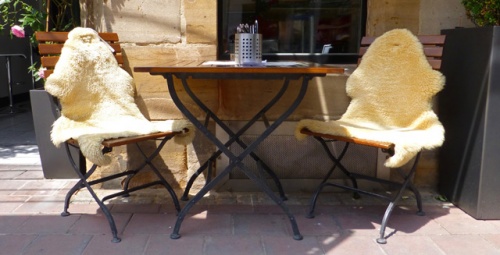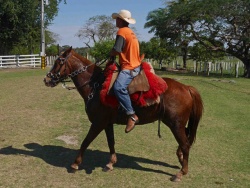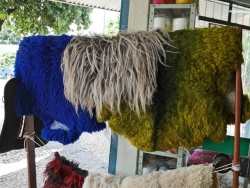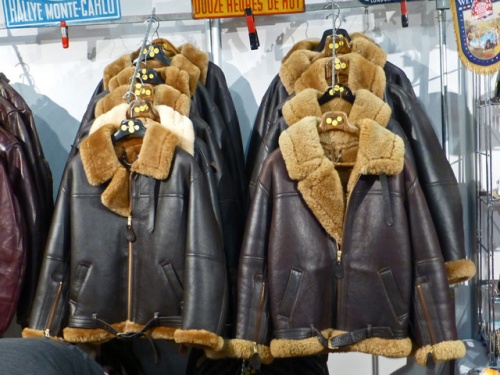Sheepskin - Lambskin
Contents
Sheepskin - Lambskin
Sheepskin and lambskin are the hides of sheep and lambs. Sometimes sheepskin is called lambskin, even if it is not from a lamb. Sheepskin and lambskin are the skins with fur. Without the fur, they are called sheep leather and lamb leather.
Sheepskins and lambskins are often sold as single pelts. They can be used for a pram or a buggy or to keep seating areas of a chair warm and soft. However, their warmth and softness also make them ideal for lambskin coats, jackets, gloves, caps, shoes and boots in winter.
There are infinitely many sheep breeds with different fur.
Left Merino lamb. Lambskins are finer than sheepskins.
The wool of the lambskin can absorb moisture up to 30% in the form of water vapour, without feeling wet or cold. The scarf structure of the wool fibre repels the dirt and thus has a natural self-cleaning quality.
Lambskins as Rawhide.
Lambskins are 100% protein. Since protein is not a breeding ground for viruses and bacteria, lambskins are often medically recommended. Lambskins have an antibacterial effect and protect the skin. Therefore, it is used for the protection of wounded skin.
Sheepskins are often placed under the saddle in the Pantanal in Brazil.
Other terms
- Suede shearling is sheepskin with the suede outside and the pelt inside (boots, gloves etc.)
- Double face is the same as suede shearling. Only when the flesh side is smoothed with a coating, the sheepskin is called nappalan.
- Beaver lamb is a lambskin with shortened hair (about 12 to 16 mm hair length), where the natural crimping is permanently removed by ironing and fixing.
- Merino lambs come from Spain. It is the leading product in the clothing sector because it has the finest wool and can be obtained in bulk as a raw material.
- Also, Tigrado lambs come from Spain. The skins have a special wool type. The hair is long and curly. The skins are much smaller than those of the Merino lambs.
- And the Merinillo hides come from Spain. They are small, very light and have very soft skins. The pelt has a silky grip. Due to the rarity, these skins are very expensive.
Lambskin jacket - Lambskin coat
Lambskin jackets or lambskin coats have the wool side to the inside and the flesh side to the outside of the clothing. The outside is therefore suede. The suede can be smoothed by a coating (nappalan) to remain less sensitive to humidity and dirt.
Typical lambskin jacket. The pelt is inside and the flesh side to the outside with a nappalan coating.
Lambskin footwear
In winter, nothing is softer and more comfortable than fur footwear to keep your feet warm.
Synthetic tanning
By using special synthetic tannins, lamb skins achieve an optimum combination of durability and washability. This tanning gives the fur a yellow-beige colour.
Lambskins are used in colder countries to lay out the baby carriage or cots. According to a study from 2014, children who have slept on animal fur during the first three months of life have a 79% reduced risk of developing asthma later. For this purposes such skins must be washable.
Washable fur with yellow-beige colour from special synthetic tanning.
Alternative tanning method. Not clear if washable.
Artificial fur
Artificial or synthetic furs are often offered because genuine furs are expensive and are also considered unethical. Artificial fur is also labelled as "Fourrure artificielle". The fibre material which looks like fur, can be of synthetic or natural origin (wool etc.).
A genuine lambskin jacket and an imitation of artificial fur.
Marking of grown lambskin and woven tissue with sheep wool.
Additional information
![]() -> COLOURLOCK - Leather & Fur Wash Concentrate for sheepskin and lambskin
-> COLOURLOCK - Leather & Fur Wash Concentrate for sheepskin and lambskin
![]() -> In German: www.lederzentrum.de
-> In German: www.lederzentrum.de
![]() -> Rest of the world: partners worldwide
-> Rest of the world: partners worldwide































 a kotori web solution
a kotori web solution